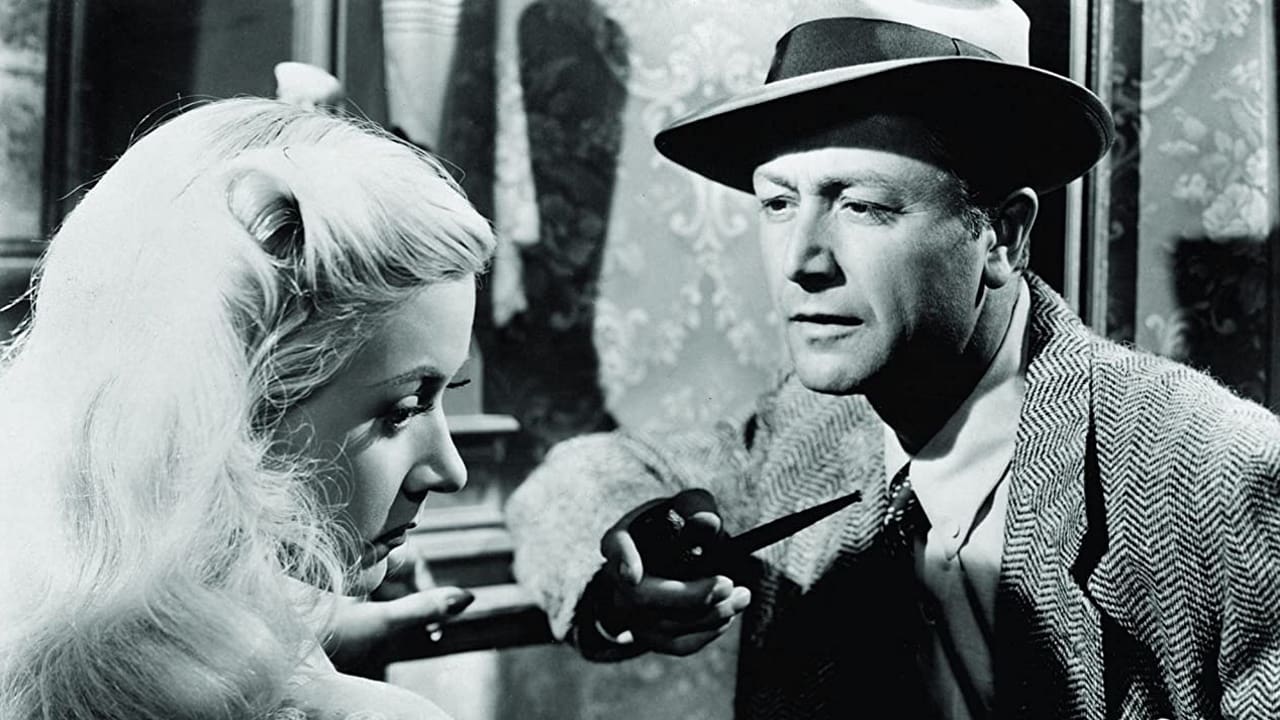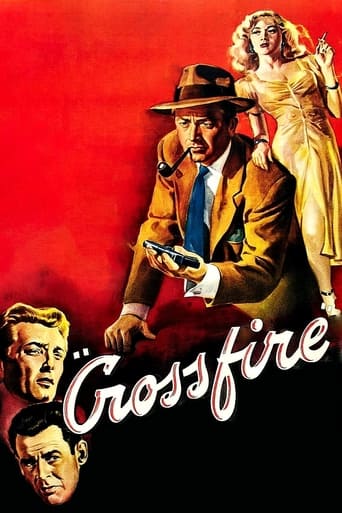



Load of rubbish!!
Don't listen to the Hype. It's awful
brilliant actors, brilliant editing
After playing with our expectations, this turns out to be a very different sort of film.
View MoreRobert Young plays a police detective trying to solve a man's murder. All the clues seem to point to a young soldier (George Cooper) who has been having issues lately and was drinking heavily the night of the murder. But the soldier's friend (Robert Mitchum) doesn't believe he's guilty so he investigates as well. Through a series of flashbacks we see what happened and discover the real murderer is an anti-Semitic soldier played by Robert Ryan.Gritty and powerful film noir with a wonderful cast. The Roberts (Young, Mitchum, Ryan) are all extraordinary, although Mitchum much less so. That isn't a slam on him. It's just the part isn't as interesting as the other two. Nice support from Gloria Grahame, Steve Brodie, Sam Levene, and Paul Kelly. George Cooper is a little too fidgety for my tastes, though. This was his only major film role. I've seen other types of performances like this in older films and it's a personal peeve of mine that can make it hard for me to enjoy the film sometimes. What I mean is a guy (usually dark-haired for some reason) who seems sweaty, nervous, and does little things like gulping a lot or making weird faces to show you how conflicted he is. Five or ten years later he would probably be heralded as a method actor. Personally I hate it. This is possibly why I gave the film a slightly lower rating the first time I saw it years ago. But upon rewatching, it didn't bother me as much and I enjoyed the film even more. It's a beautifully shot film noir with a terrific script and excellent acting. Definitely a classic everybody should see.
View MoreEDWARD DMYTRYCK was probably one of the best makers of noir in Hollywood. MURDER MY SWEET was awesome. CROSSFIRE is another great noir with some great gimmicks and cinematography while being slightly preachy on anti-semetism. But the film does suffer from a major drawback - you know who the killer is at the beginning itself, and after that it is only a matter of nailing him.ROBERT MITCHUM is sublime in this. with just a few expressions and tilts of the head, MITCHUM adds so much to the character. He is almost effortless. ROBERT RYAN was menacing and there was a raw physicality to his performance. GEORGE COOPER turns in a fine performance as a soldier who pines for his wife. GLORIA GRAHAME had too much make up on. I remember liking her a lot in IN A LONELY PLACE. She came across as phony in this film.(7/10)
View MoreThe movie dramatizes an important subject: anti-Semitism. The problem is that it does not generate the outrage and indignation that the subject warrants. This happens partly because the subject is treated in the context of a conventional Hollywood crime drama which further dilutes and distracts attention away from the theme. Furthermore, the principal character, an Army veteran just discharged from the service, is not a completely unsympathetic character; he has legitimate issues too which could be distorting his thoughts. In short, the movie is to be commended for taking on the topic of bigotry but does not go far enough in driving home the subject. Robert Ryan is excellent as the army veteran who is an anti-Semite and the rest of cast is excellent too. Yet the movie does not leave one with a feeling of social injustice. Rather, it leaves one feeling glad that a murderer has been caught but with no resolution of the larger political and social questions which although addressed remain unanswered.
View MoreThis starts like it always happens, bunch of people in a bar. There is a woman involved. Later in the apartment, the husband turns up dead and the suspect is one of a group of soldiers.I will recommend this to you as an unfairly neglected gem, especially to seasoned noir fans who appreciate how film noir is all about a narrator succumbing to hallucination. Its reputation - tense but obvious - is a little tarnished because the main thrust against racial prejudice is overstated, so it's easy to contend yourself that you know so have the upper hand and nothing beyond the hardboiled mystery is worth paying serious attention to. Not so, not so by a mile my friends.The Jewish angle was introduced to make this pose as a serious postwar lesson, you will know it is plain tacky from how quickly the police captain can suss it out as the root of evil. And nothing more patronizing than the captain lecturing about it a young hick from Tennessee, playing up the same stereotype it warns against. You may appreciate this a little more, anyway, when you learn that it was changed from homosexuality in the originating text. Traces are cleverly preserved in the film so be on the lookout.So the bulk of the film is male hierarchy between soldiers, so people in transit, inbetween lives, inbetween shifting of identities. One of them used to be a cop in that other life, another an artist so a sensitive man. Now they're all in the same uniform stationed in the same limbo and all sorts of wounds from the war have not healed.So here's a film that, already by '47, can elucidate what noir is all about and why it feels the way it does; it's about men returned from the certainty of killing, chaos that was nevertheless safety because ordered from above, to open life where you, it had to be you now, had to be someone again and responsible for your own story. So it was a stressful thing, because it could turn out that you are no one at all and have no story, hence the dissolution of self so common in noir, hence the hallucinations, the world conspiring against you, the feeling of dazed powerlessness disguised as fate from above. One option you have is to read everything with repressed male sexuality in mind, that is fine, Beau Travail. But let me point you at something else, what I call layered dreaming. Our artist was out at night dreaming but has no recollection what about, except it started with stress and thinking about his wife that he misses. Mitchum smoothly talks him into all gradually coming back to him, and sure enough; he was with this other woman, and sure enough a woman that reminds him of his wife, and wants him home to wait for her.But something weird happens there. He has fallen asleep and wakes up to find a second man, a really puzzling figure.This guy is the key to the whole mystery. He holds together several layers, by shifting stories that shift identities that shift the gears of knowing and dreaming what this is all about.He says he's just a man waiting for her. He is the husband back home, to a wife he enlisted and couldn't wait to get back to, but once he did she didn't want him.He's not the husband, and just met her at the same joint. He wants to marry her but she won't have him. That's a lie too.If you have no imagination, and why would you dream about him if you don't, he's just the pimp a little wobbly from the war himself. Boring. You will know him as our guy, remember he is telling the story and the story is about waking up, so our guy hallucinating different selves and each self has a life out there and comes back home, maybe an empty home, maybe waiting for a woman who is not there, maybe she could be the wife, maybe it isn't even a home, at any rate it is him in that place he comes back to at nights and mutters to himself echoes from that maybe-life out there.If I had to pick a single favorite moment in film noir, this would be it. Not even Welles touches it. As a metaphor about the mind, it's worthy of being in Blowup.
View More